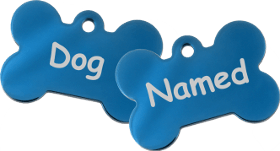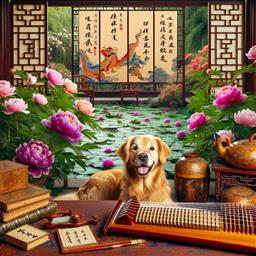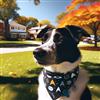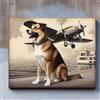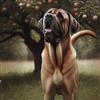Wu Chinese Dog Names
Updated: May 25, 2024
The rich culture and history of China, specifically of the Wu region, is a great source of inspiration when it comes to naming our canine companions. This page is dedicated to providing a unique selection of dog names, all derived from the beautiful Wu dialect, one of the many vibrant tongues spoken across China. For those who appreciate the nuances in languages and are fond of the cultural diversity in the world, these suggestions will add a distinct charm to your dog's identity.
Each name in our diverse collection carries with it a blend of traditional and contemporary, reflecting the essence of the Wu culture. Whether you are looking for a name with a specific meaning or simply a name that sounds beautiful, you will find a wide array here. From names inspired by nature and mythology to those signifying strength and virtue, this collection offers a wide spectrum of choices for your beloved pet.
So if you're eager to give your pup a name that is as unique and charming as they are, dive into our selection. These names aren't just labels, but a homage to a rich culture and a lovely language. Your dog's name will be a topic of conversation and intrigue, reflecting your appreciation for the diverse languages and cultures of our world.
| Name | Reason to Choose |
|---|---|
| An | It means peace, suiting calm dogs |
| Bao | It means treasure, perfect for a cherished pet |
| Bei | It can mean 'north' |
| Bi | Signifies jade, a precious gem, showing the dog's value |
| Bing | It implies health, a key quality in any pet |
| Bo | This name means 'waves' |
| Cai | Connotes wealth, a metaphor for a dog's worth |
| Chang | This name means 'flourishing', a good fit for a healthy, energetic dog |
| Chen | It means dawn, perfect for early-riser dogs |
| Chuang | It means bed, fitting for dogs that love to sleep |
| Chun | This name means 'spring', a lovely name for a dog born in the spring |
| Dai | It means to carry, fitting for dogs that fetch |
| Dawei | Inspired by the Wu Chinese word for 'greatness' |
| Di | Signifies low, fitting for dogs with a low bark |
| Dong | This name signifies 'east' |
| Du | Signifies independent, for dogs that like alone time |
| Fang | It means square, perfect for boxy breeds |
| Fei | This name signifies 'fly' |
| Feng | Derived from a word signifying wind |
| Fu | It means wealthy, showing the dog's worth |
| Fugui | This name means 'wealth' in Wu Chinese |
| Gan | It implies feeling, showing a dog's emotional depth |
| Gou | It signifies hook, fitting for dogs that love to catch |
| Gui | This name means 'honorable' |
| Guo | Signifies country, for dogs that love the outdoors |
| Han | Signifies cold, fitting for dogs that love winter |
| Hao | It can mean 'good' or 'brave' |
| He | This signifies 'harmony' |
| Hongli | This name means 'great power' in Wu Chinese |
| Hu | It means tiger, perfect for fierce dogs |
|
Suggest:
|
Submitted!
|
| 1 2 3 4 5 | |
Names based on Wu region's fauna and flora
| Name | Description |
|---|---|
| Azalea | Named after the Azalea flower, which blooms in various parts of the Wu region |
| Bambu | Named after the bamboo plants which are abundant in the Wu region |
| Baozi | A popular steamed bun in the Wu region |
| Carp | Inspired by the Carp fish which are common in the Yangtze River |
| Cherry | Inspired by the Cherry Blossom trees in the Wu region |
| Chrys | Short for Chrysanthemum, the official flower of Wuhan city |
| Crane | Inspired by the Red-crowned Crane which is native to the Wu region |
| Dragon | Symbol of Chinese culture and commonly seen in Wu region festivals |
| Herb | Named after the numerous herbs used in traditional Chinese medicine in the Wu region |
| Heron | Refers to the Herons that inhabit the wetlands of the Wu region |
| Hibis | From Hibiscus, a type of flower commonly found in the Wu region |
| Jasmine | Named after the Jasmine flower, a symbol of purity in the Wu region |
| Jiang | Refers to the Yangtze River which flows through the Wu region |
| Koi | Refers to the Koi fish which are common in the ponds and rivers of the Wu region |
| Longjing | A variety of green tea grown in the region |
| Lotus | Named after the Lotus, a flower commonly found in the lakes of the Wu region |
| Magnolia | Inspired by the Magnolia trees, the city flower of Shanghai in the Wu region |
| Narciss | Inspired by the Narcissus, a flower that grows in the Wu region during winter |
| Osman | Inspired by the Osmanthus, a flower that grows in the Wu region |
| Panda | Inspired by the Giant Pandas found in the Chengdu Research Base which is close to the Wu region |
| Peach | Named after the Peach trees which are common in the Wu region |
| Pear | Named after the Pear trees which are common in the Wu region |
| Stork | Inspired by the Black Stork, a bird species native to the Wu region |
| Wister | Short for Wisteria, a type of flowering plant found in the region |
| Yuhua | Named after the Yuhua Tea, a famous green tea from Nanjing |
|
Suggest:
|
Submitted!
|
Names based on popular Wu region cultural figures
| Name | Description |
|---|---|
| Bai | In honor of Bai Juyi, one of the greatest poets of the Tang Dynasty |
| Du | After Du Fu, a prominent Chinese poet of the Tang Dynasty |
| Han | In homage to Han Yu, a prominent essayist and poet of the Tang Dynasty |
| Hu | After Hu Shi, a philosopher, essayist and diplomat |
| Hui | In respect to Hui Shi, a notable philosopher in the Warring States period |
| Jiang | Named after Jiang Yiyan, an acclaimed actress and photographer from the Wu region |
| Li | A tribute to Li Bai, one of the most celebrated poets in Tang Dynasty |
| Ling | After Ling Bing, a famous Wu-region archaeologist |
| Liu | After Liu Shaoqi, a revolutionary, statesman, and theorist who served as Chairman of the People's Republic of China |
| Lu | Paying tribute to Lu Xun, one of the most influential writers in modern Chinese literature |
| Mao | From Mao Dun, a 20th-century novelist, cultural critic, and journalist |
| Nie | In respect to Nie Er, a composer best known for March of the Volunteers, the national anthem of the People's Republic of China |
| Qin | Paying respect to Qin Hui, a historian and public intellectual |
| Shen | Honoring Shen Wei, a dancer, choreographer, painter and designer |
| Su | After Su Shi, a prominent poet, artist, and calligrapher in the Song dynasty |
| Tao | In respect to Tao Yuanming, a poet of the Eastern Jin and Liu Song periods |
| Wang | Honoring Wang Yangming, a philosopher, official, educationist, calligraphist and general in the Ming dynasty |
| Wei | After Wei Yuan, a scholar and reformer of the Qing Dynasty |
| Wen | Named after Wen Tianxiang, a scholar-general in the last years of the Southern Song Dynasty |
| Xu | Honoring Xu Guangqi, a scholar-bureaucrat, agricultural scientist, astronomer, and mathematician in the Ming Dynasty |
| Yang | From Yang Fudong, a leading contemporary artist, known for his films and photographic works |
| Yao | From Yao Ming, a retired professional basketball player who played for the Shanghai Sharks |
| Zhang | In remembrance of Zhang Haidi, a writer and disabled rights activist |
| Zhou | In homage to Zhou Enlai, the first Premier of the People's Republic of China |
| Zhu | Honoring Zhu De, a Chinese general, warlord, politician, revolutionary, and founding member of the Communist Party of China |
|
Suggest:
|
Submitted!
|
Names based on Wu dialect words
| Name | Description |
|---|---|
| Chen | Signifies 'morning', apt for a dog that loves early morning walks |
| Chun | This word denotes 'spring', a suitable name for a dog born in the spring season |
| Fei | Signifies 'fly', for a dog with a sprightly, lively character |
| Feng | This word signifies 'wind', a fitting name for a fast, agile dog |
| Hai | Translates to 'ocean', an excellent name for a dog that loves the beach |
| Huo | Translates to 'fire', a suitable name for a dog with a fiery spirit |
| Jin | This word means 'gold', making it an excellent name for a golden-coated dog |
| Lan | Means 'blue', a unique name for a dog with blue eyes |
| Lei | Signifies 'thunder', a strong name for a dog with a powerful bark |
| Liang | This word signifies 'bright', a fitting name for a dog with a bright, cheerful demeanor |
| Mao | Translates to 'fur', a cute name for a furry dog |
| Qi | Means 'rise', suitable for a dog that always gets up, no matter the hurdles |
| Qing | Means 'clear' in Wu, a great name for a dog with a clear, piercing gaze |
| Qiu | Means 'autumn', a lovely name for a dog born in the fall season |
| Shan | Signifies 'mountain', a sturdy name for a dog that loves to hike or climb |
| Shui | The Wu word for 'water', making it ideal for a dog that loves swimming |
| Tai | Means 'peace', for a calm, serene dog |
| Tian | This word means 'sky', a great name for a dog with a limitless spirit |
| Wang | Means 'king', a regal name for a dog with a commanding presence |
| Xin | Translates to 'heart', a lovely name for a loving, affectionate pet |
| Xue | This name means 'snow' in the Wu dialect, perfect for a white or fluffy dog |
| Yan | This word means 'flame', a great name for a dog with a fiery, passionate spirit |
| Yin | Means 'silver', a fitting name for a dog with a silver or gray coat |
| Yue | Represents 'moon', an elegant name for a dog with a serene, calm presence |
| Zhuang | This word means 'strong', a solid name for a robust dog |
|
Suggest:
|
Submitted!
|
Names based on famous landmarks in Wu region
| Name | Description |
|---|---|
| Bund | Named after The Bund, one of the most famous tourist destinations in Shanghai |
| Changning | Changning is a district in Shanghai, which lends itself to be a cool dog name |
| Chedun | Inspired by Chedun, a historic town in Shanghai |
| Dapuqiao | Dapuqiao is a popular commercial area in Shanghai |
| Fuxing | Fuxing Park in Shanghai is the inspiration for this name |
| Gaoqiao | Gaoqiao is a historic town in Shanghai |
| Hengshan | Honoring Hengshan Road, a famous road in Shanghai known for its nightlife |
| Hongkou | An homage to Hongkou, a district in Shanghai |
| Huangpu | Inspired by the Huangpu River, a notable river in Shanghai |
| Jingan | Inspired by Jing'an Temple, a famous temple in Shanghai |
| Jinmao | The name is derived from the Jin Mao Tower, a landmark skyscraper in Shanghai |
| Lujiazui | This is a reference to Lujiazui, the financial district in Shanghai |
| Nanjing | Honoring Nanjing Road, one of the world's busiest shopping streets in Shanghai |
| Oriental | A tribute to the Oriental Pearl Tower, a notable landmark in Shanghai |
| Pudong | Pudong is a district in Shanghai known for its stunning skyline |
| Qibao | An homage to Qibao, a historic area in Shanghai |
| Qingpu | Qingpu is a district in Shanghai, making it a unique dog name |
| Wusong | Wusong is a historic location in Shanghai |
| Xintiandi | This name reflects the stylish and iconic area in Shanghai known for its history and culture |
| Xujiahui | In honor of Xujiahui, a commercial district in Shanghai |
| Yangpu | This name is a nod to Yangpu, a district in Shanghai |
| Yuyuan | Inspired by the Yuyuan Garden, which is a renowned classical garden located in Shanghai |
| Zhabei | Named after Zhabei, a district in Shanghai |
| Zhenru | A tribute to the historic town of Zhenru in Shanghai |
| Zhujiajiao | Named after Zhujiajiao, an ancient water town in Shanghai |
|
Suggest:
|
Submitted!
|
Names based on popular foods in Wu region
| Name | Description |
|---|---|
| Baozi | Named after a popular Wu region steamed bun |
| Beggar | Inspired by 'Beggar's Chicken', a famous Wu dish |
| Congee | A type of rice porridge enjoyed in the Wu region |
| Dongpo | Dongpo Pork is a popular dish in the Wu region |
| Ganbei | A common toast during meals, meaning 'bottoms up' |
| Jiaozi | Refers to the much-loved dumpling of the Wu region |
| Lion | Lion's Head meatballs is a well-known Wu dish |
| Lotus | Lotus root soup is a common dish in Wu |
| Mantou | Represents the plain steamed buns in Wu cuisine |
| Mooncake | Traditional Wu pastry eaten during the Mid-Autumn Festival |
| Niangao | A type of rice cake popular in Wu |
| Noodle | Noodles are a beloved food in the Wu region |
| Peanut | Peanuts are a common ingredient in Wu region |
| Rice | Rice is a staple food in the Wu region |
| Shaoxing | Refers to Shaoxing wine, a key ingredient in Wu cooking |
| Shengjian | Inspired by the pan-fried bun of Wu |
| Soy | Soy-based foods are staples in Wu cuisine |
| Sparerib | Sweet and sour spare ribs are a Wu region specialty |
| Tangyuan | This sweet soup ball is a Wu dessert |
| Tea | Tea is integral to Wu culture |
| Wine | Wine plays a big role in Wu cuisine |
| Wontun | A popular soup dumpling in Wu |
| Xiaolong | Named after Xiaolongbao, a type of soup dumpling |
| Youtiao | A deep-fried dough stick common in the Wu breakfast |
| Zongzi | Reflects the traditional rice dish often eaten during Dragon Boat Festival |
|
Suggest:
|
Submitted!
|
User Submitted Images
There are currently no user submitted images for this page. This is your opportunity to be the first! Submit your photo below.
User Recommendations
There are currently no name recommendations for this page. This is your opportunity to be the first! Make your recommendation below.
Recently Updated
We would like to take this time to thank all of our visitors that make DogNamed.com the best dog naming resource on the web. Our site would not be where it is today without your suggestions, ratings, and photo submissions. So pat yourselves on the back for a job well done and keep up the good work! If you have any comments, suggestions, or ideas for the this page or any part of our site, don't hesitate to drop us a line on our Contact Page. Thank you! -The DogNamed Team
